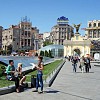In some tourism destinations including also developed countries, a balance among these three dimensions has not yet been achieved. This misbalance might generate not only dissatisfaction among inhabitants of tourism regions but also a potential threat to the environment[1].
Tourism draws on a wide range of services and infrastructure and effects many aspects of life in a tourism destination. This is why the active involvement of different actors of society is essential for the design of sustainable tourism strategies. Only then economic, social, and environmental aspects can be balanced when defining the future direction of a destination’s development. Only then, a coordination of efforts will create the strongest results[2].
Long-term tourism strategies taking into account economic, social and environmental aspects foster innovative projects. Although tourism can be perceived as a driver of economic development on its own, social and environmental aspects can also be innovative sources of economic opportunities resulting in, for instance, sustainable products made in the tourism destination. Ensuring broad involvement including also the civil society in different aspects of tourism can benefit not only the successful implementation of tourism strategies but also innovation in sustainable economies, which may facilitate the balance among economic, social and environmental factors.








